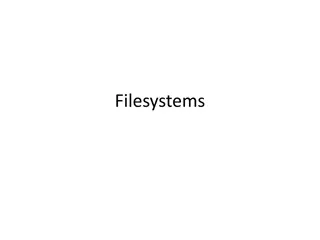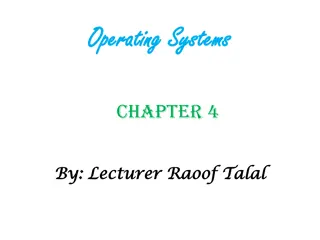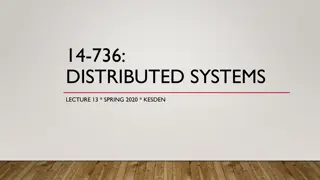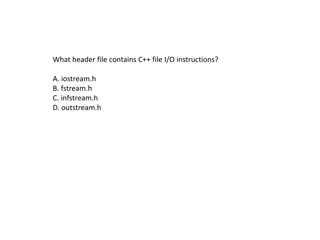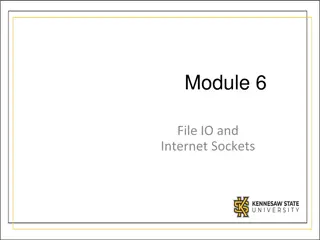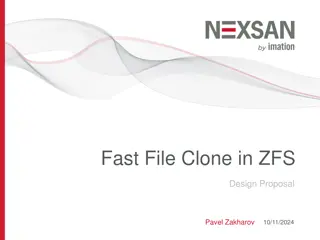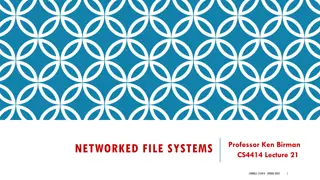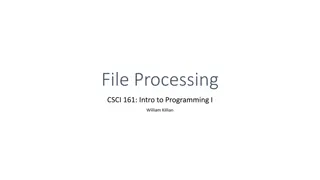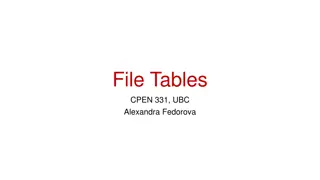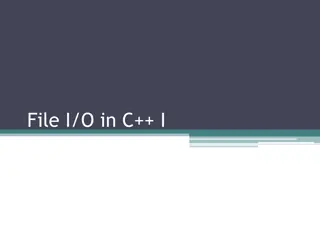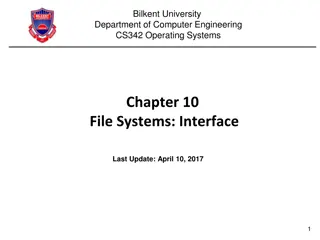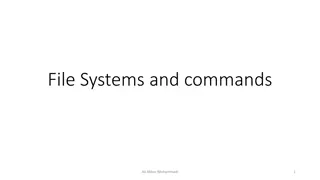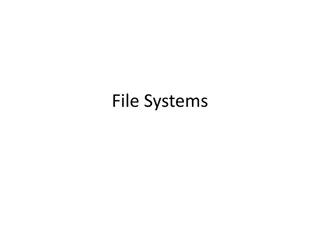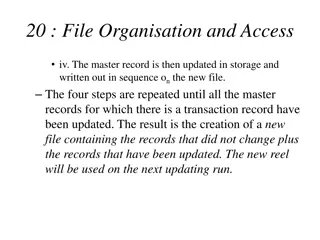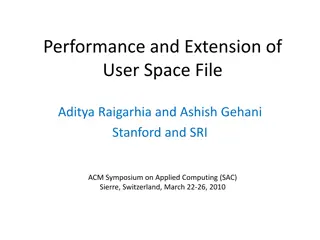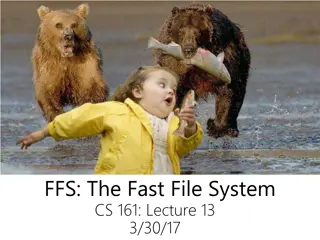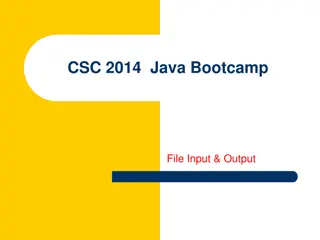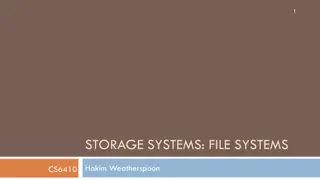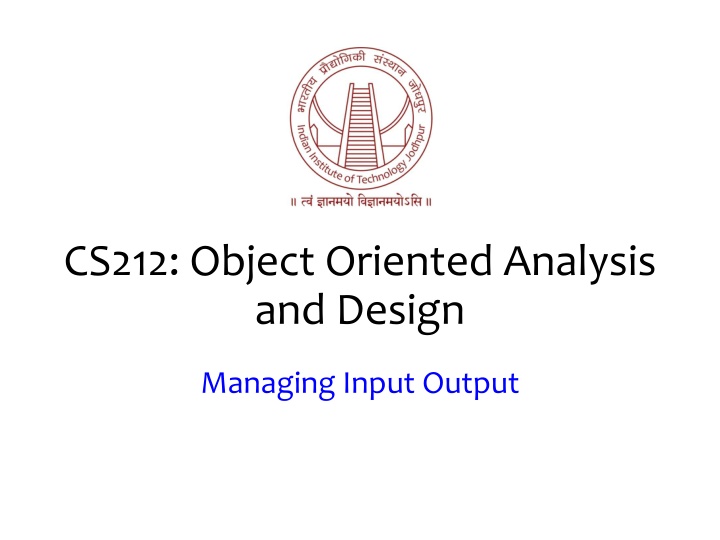
Streamlining File Handling in Object-Oriented Analysis and Design
Learn how to efficiently manage input and output streams in Object-Oriented Analysis and Design (CS 212) using C++ file stream classes. Explore techniques for opening, closing, and associating streams with files, along with default mode settings for ofstream, ifstream, and fstream classes.
Download Presentation

Please find below an Image/Link to download the presentation.
The content on the website is provided AS IS for your information and personal use only. It may not be sold, licensed, or shared on other websites without obtaining consent from the author. If you encounter any issues during the download, it is possible that the publisher has removed the file from their server.
You are allowed to download the files provided on this website for personal or commercial use, subject to the condition that they are used lawfully. All files are the property of their respective owners.
The content on the website is provided AS IS for your information and personal use only. It may not be sold, licensed, or shared on other websites without obtaining consent from the author.
E N D
Presentation Transcript
CS212: Object Oriented Analysis and Design Managing Input Output
Streams Input Stream Extraction from input stream Input device Program Output Stream Insertion into output stream Output device
C++ stream class ios C++ provides various standard classes for I/O management istream ostream File stream classes allows easy file handling iostream File stream classes are declared in the fstream header file ifstream ofstream An object that belongs to a file stream class is known as a file stream fstream Object Oriented Analysis and Design (CS 212)
Introduction Object Oriented Analysis and Design (CS 212)
Opening and Closing a File Open a file by linking it to a stream (must first obtain a stream) Input stream: declare the stream to be of class ifstream Output stream: declare it as class ofstream I/O stream: declared as class fstream ifstream in; // input ofstream out; // output fstream io; // input and output Object Oriented Analysis and Design (CS 212)
Opening a File from Disk Associate a stream with a file is by using open() void ifstream::open(const char *filename, ios::openmode mode = ios::in); void ofstream::open(const char *filename, ios::openmode mode = ios::out | ios::trunc); void fstream::open(const char *filename, ios::openmode mode = ios::in | ios::out); Object Oriented Analysis and Design (CS 212)
Opening a File from Disk void open ( const char *filename , ios::openmode mode); 1. The name and location of the file to be opened 2. The mode in which the file should be opened (optional). Mode Flag Description ios::app Append mode. All output to that file to be appended to the end. ios::ate Open a file for output and move the read/write control to the end of the file. ios::in Open a file for reading. ios::out Open a file for writing. ios::trunc If the file already exists, its contents will be truncated before opening the file. Object Oriented Analysis and Design (CS 212)
Default mode of streams Open member functions of classes ofstream, ifstream and fstream has a default mode That is used if the file is opened without a second argument Class Default mode parameter ofstream ios::out ifstream ios::in fstream ios::in | ios::out Object Oriented Analysis and Design (CS 212)
Combining I/O Mode Two or more of flags can be combined by ORing them together. ofstream outfile; outfile.open("file.dat", ios::out | ios::trunc ); 1. 2. Truncate it in case it already exists. Open a file in write mode, and fstream afile; afile.open("file.dat", ios::out | ios::in ); 1. 2. Writing. Open a file in reading, and Object Oriented Analysis and Design (CS 212)
To check if File is Open To check if a file stream was successful opening a file Calling to member is_open. This member function returns a bool value True in the case that indeed the stream object is associated with an open file False otherwise. if (myfile.is_open()) { /* ok, proceed with output */ } Object Oriented Analysis and Design (CS 212)
Closing a File (already opened !!) When a C++ program terminates It automatically closes flushes all the streams, Release all the allocated memory and Close all the opened files. But it is always a good practice that A programmer should close all the opened files before program termination. Standard syntax for close() function A member of fstream, ifstream, and ofstream objects. mystream.close(); Object Oriented Analysis and Design (CS 212)
Read line by line from Data File Function that performs input is getline() istream &getline(char *buf, streamsize num); Reads characters into the array pointed to by bufuntil either num 1 The end of the file has been encountered istream &getline(char *buf, streamsize num, char delim); Reads characters into the array pointed to by bufuntil either num 1 characters have been read The character specified by delimhas been found The end of the file has been encountered Object Oriented Analysis and Design (CS 212)
Customized I/O and Files Insertion and extraction operators were overloaded relative to user defined classes The same overloaded inserter or extractor function to perform I/O on a file Demonstration Object Oriented Analysis and Design (CS 212)
Processing Text Files Text file streams are those where The ios::binary flag is not included in their opening mode. These files are designed to store text All values that are input or output from/to them can suffer some formatting transformations Values do not necessarily correspond to their literal binary value. Object Oriented Analysis and Design (CS 212)
Error Handling Member functions of the stream object to check for specific states of a stream All of them return a bool value. Return Value and Meaning Function True False eof() End of file is encountered while reading. fail() I/O operation failed. Otherwise Invalid operation is attempted or any unrecoverable error has occurred. bad() good() No error has occurred. Object Oriented Analysis and Design (CS 212)
Positioning the File Pointer I/O stream objects keeps internal stream position ifstream get, ofstream put, fstream get and put Positions can be read and modified Object Oriented Analysis and Design (CS 212)
tellp() and tellg() tellp() Get position in output sequence streampos tellp(); tellg() Get position in input sequence streampos tellg(); Object Oriented Analysis and Design (CS 212)
seekp() and seekg() Overloaded function (1) ostream& seekp (streampos pos); (2) ostream& seekp (streamoff off, ios_base::seekdir way); (1) ostream& seekg (streampos pos); (2) ostream& seekg (streamoff off, ios_base::seekdir way); Value Offset relative to ios_base::beg Beginning of the stream ios_base::cur Current position in the stream ios_base::end End of the stream Object Oriented Analysis and Design (CS 212)
Binary Files Reading and writing data with the extraction and insertion operators Functions like getline is inefficient We do not need to format any data and data is likely not formatted in lines. write ( memory_block, size ); read ( memory_block, size ); 1. Type char* (pointer to char), 1. It is an integer value. 2. Represents the address of an array of bytes where the read data elements are stored or from where the data elements to be written are taken. 2. Specifies the number of characters to be read or written from/to the memory block. Object Oriented Analysis and Design (CS 212)



